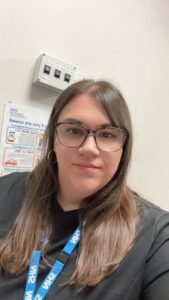Treating common conditions via Pharmacy First, Tennant Street Practice, Stockton on Tees
For Lianne Mawson, receptionist at Tennant Street Practice, the evidence that referring to pharmacies using the Pharmacy First service works is all in the numbers.
“On an average day we can refer between 10 to 20 patients to the Pharmacy First scheme for UTIs, rashes, ear infections and minor skin conditions, she explains.
The benefit to the practice is it frees up the time for the GP and the nurse practitioners, for them to see other illnesses that can’t be dealt with by Pharmacy First.
Convenience and swift treatment for patients
The Pharmacy First service takes referrals from general practice into community pharmacies. The pharmacies then provide a minor illness consultation, which may include the supply of a medicine that would otherwise have to be prescribed by a GP. NHS 111 and Urgent and Emergency Care settings can also refer to the service.
It’s not just the receptionist team that are singing the service’s praises.
For Rachael Wilson, Nurse Practitioner at the Teesside practice, part of North Stockton PCN which serves around 45,000 patients across its Tennant Street, Queens Park and Alma Medical Centre practices, it’s all about patient convenience.
“ …it offers them a time that suits, it’s quick access for medical advice and if needed the pharmacy are very good at referring patients back to the GP”
Sanjay Nath, Pharmacist at the nearby Fairfield Pharmacy definitely agrees with the point on quick access to services. He says:
“For the vast majority of patients that I see I can manage and give the patient the appropriate treatment. When there is a need to escalate, I’ve been able to contact the surgery, get the patient a telephone appointment the same day and see the patient later on with a prescription in their hand for the appropriate treatment.”
Practical examples of the service in action
Each patient treated successfully by the pharmacy builds confidence in the new service which has been available since 31 January 24, and enables pharmacists to supply prescription-only medicines to treat seven common conditions.
Rachael describes how the new service works at the practice and how it helps reduce pressure for practice staff:
“The reception team will review the presentations coming through. If they feel that it’s eligible for Pharmacy First they will direct it to the pharmacy.
.“It potentially can save a lot of workload – patients can be seen locally and treated locally with the confidence that anything that’s a bit more complicated will be referred back to the practice. “
Having the option of treatment via Pharmacy First is making a real difference to patients at the practice.
Lianne recalls a recent example, “We had a patient who was referred to Pharmacy First for a UTI and she fed back to us that she thought it was really great – she didn’t know that service was available. She was referred to the pharmacy, she was seen very quickly and was treated the same day.”
Community pharmacists are also benefitting from the new service. Sanjay concludes
“Feedback from the patients has been overwhelmingly positive. The surgeries have been on board with the programme – they are referring a lot of patients to us and are starting to see the benefits.
“It’s a new direction, it’s a new set of skills for pharmacists and it’s really satisfying to be able to see positive outcomes for patients.”
For more information about using Pharmacy First visit https://www.england.nhs.uk/primary-care/pharmacy/pharmacy-services/pharmacy-first/
